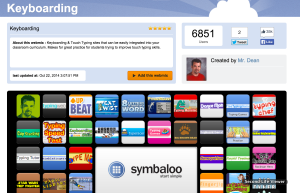It’s your first night for your online course. You meet with your online students through
video conferencing (We use Zoom.us) so that your distant students will have a
feeling of belonging to a group instead of just talking with each other through
discussion forums. This is when you have to take attendance, review the
syllabus and preview the class so that your students will know what to expect,
right?
Wrong. Involved
learning is a social process and if you want your students to feel “part of the
class”, it is more important for you to help them connect with you and the
class members in the first class session. This is especially important in an online
class where faltering technology and unfamiliarity can get in the way of
students feeling part of group.
There are plenty of ice breakers that teachers do in
face-to-face classrooms, but they don’t usually translate to online interaction well. I teach an online course entitled Using
Digital and Social Media in Education for undergrads and graduate students at
the University of Northern Iowa. I was looking around for a way to create an
easy-to-use interactive ice breaker and I happened upon an idea for the age old
game, 2 Truths and a Lie.
Two Truths and a Lie is
a great party game where you make three statements about yourself. Two of the statements are true and one is a
lie. This activity allows people to share about themselves at a comfortable
level of disclosure. The only problem is that if we just make the statements
orally, the interaction with the class can get lost. The trick is to create an interactive tool. I did this using an Open Google Spreadsheet. This was a document where students could type
their statements simultaneously and then post judgments about their opinions
about each of their colleagues’ disclosures.
Preparation Steps
- Begin by creating a Google Spreadsheet like the one in
Figure 1. (You can actually make a copy
of my spreadsheet, tinyurl.com/2truthz1lie
- Set the “Share” settings so that “Anyone with the Link” “Can
edit” the file. This will allow your students to add their Truths and Lies and
add their voted in the appropriate columns.
Your students won’t need to sign-in to do this.
- Add your name in the “0” row and then add your students’
names in the appropriate rows.
- Add your 2 Truths and a Lie in your section. This is a great way to share something about
yourself while demonstrating the process.
Running Truths and
Lies
- Share the link to your spreadsheet with your students.
- Show them their names and the number next to each of their
names.
- Point out that there are numbered columns in the table and
that each of their columns align with the numbers next to their names.
- Have them read each of your statements and cast their votes
about whether they are Truths or Lies.
- Once they have casted their votes, you can tell the story
about each of your statements.
- As you tell each story, add a T or L in the Answer column.
The column has been set so that letters into this column will be red.
- Now it is time for your students to share about themselves.
Each of the students will add their statements (2 truths and a lie).
- Once they have added their statements, they just need to cast
their votes.
- The best part comes now when your students explain their
statements like you did with your proclamations. You might want to break it up so that half of
your students share now and the others do it towards the end of your session.
Caution: I found that students who were
connecting through their ipads had problems completing the table. This seemed to be fixed by downloading the
Sheets App from the Apple Store.
Give this a try. I would love to get your feedback and hear about how it worked in your class.
Z













